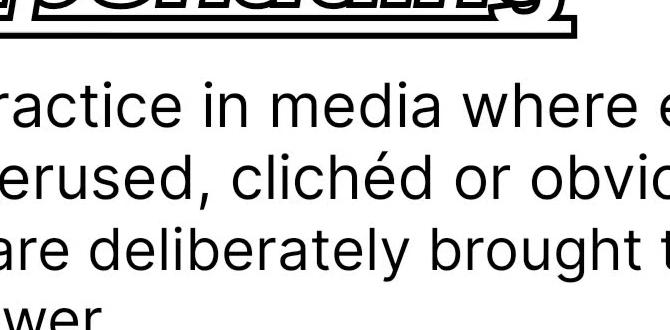Have you ever walked into your bathroom and asked, “Why is my toilet water brown?” It’s a puzzling sight. Seeing brown water can make anyone feel uneasy. You might wonder if there’s a problem with your plumbing or if it’s just some dirt.
Imagine getting ready for a quick bathroom break. You pull the lever, only to be greeted by that murky mess. Yikes! This unusual color can worry even the calmest person. But don’t panic; you’re not alone in this!
Many people experience this strange issue. It can happen for different reasons. Sometimes, the water gets stirred up. Other times, rust or minerals might be the cause. Learning why this happens is important. It can help you decide what to do next.
Let’s dive into the reasons behind that pesky brown water and find solutions together!
Why Is My Toilet Water Brown? Causes And Solutions Explained

Why Is My Toilet Water Brown?
Brown toilet water can be alarming. It usually indicates a problem with your plumbing. Often, rusty pipes or old toilets lead to discoloration. Curious about how this happens? When water sits in metal pipes, oxidation occurs, making it rusty. Sometimes, sediment or dirt from pipes also causes the brown color. Regular maintenance helps avoid these issues. Isn’t it fascinating how something as simple as toilet water can tell you about your plumbing health?Common Causes of Brown Toilet Water
Rust and Corrosion in Pipes. High Sediment Levels in Water Supply.Brown water in your toilet can be a sign of several issues. One main cause is rust. This happens in old pipes that start to corrode. Rust can mix with water, creating a brown tint. Another cause is high sediment levels. If your water supply has too much dirt or minerals, it can make the water look muddy. Both problems can be fixed with proper plumbing checks and water filtration.
What causes brown toilet water?
Rust in pipes and high sediment levels can lead to brown toilet water. Old and rusty pipes break down over time, while excess dirt in water supplies can cause similar discoloration.
Common Issues:
- Rust and Corrosion in Pipes
- High Sediment Levels in Water Supply
Identifying the Source of the Problem
Inspecting the Toilet Tank and Bowl. Checking for Leaks or Pipe Damage.To figure out why your toilet water is brown, start by inspecting the toilet tank and bowl. Open the tank lid and look for brown stains or sediment. Check the bowl, too. Look for rust or dirt. Next, check for leaks or pipe damage. A leak can let dirty water in. Damaged pipes might also cause problems. Here are some things to check:
- Look for cracks in the toilet tank.
- Check for water stains around the toilet base.
- Inspect pipes for corrosion or leaks.
What should I check for in my toilet tank?
Look for rust, dirt, or staining. These can tell you what is causing the color change.
How can I find leaks?
Check for water pooling around the toilet. Listen for dripping sounds, too!
Temporary Solutions to Brown Toilet Water
Flushing the System. Cleaning with Baking Soda and Vinegar.To address brown toilet water, there are quick actions you can take. First, flushing the system can help. Run water for a few minutes to push out problems. Next, try a simple mix of baking soda and vinegar. Pour a cup of baking soda into the toilet, then add a cup of vinegar. Let it fizz and sit for an hour. This can help clean and reduce stains.
Can These Methods Fix Brown Toilet Water?
Yes! These methods can help make your toilet water clearer and cleaner. Flushing helps clear out dirt. The baking soda and vinegar mix cleans stains effectively. Always monitor your toilet water afterward.
Long-Term Remedies for Discolored Toilet Water
Installing a Water Filtration System. Regular Plumbing Maintenance and Inspections.To fix brown toilet water, here are two helpful solutions. First, you can install a water filtration system. It cleans your water and can keep it clear. Second, do regular plumbing maintenance. This means checking your pipes and fixtures often. It helps catch problems early. When you keep an eye on your system, you avoid bigger issues later.
How can a filtration system help?
A filtration system removes dirt and minerals that cause brown water. It can make your drinking and toilet water cleaner.
Other Benefits:
- Better tasting water
- Less buildup in pipes
Why is plumbing maintenance important?
Regular plumbing checks can save you money and trouble. A small issue can turn big and messy if ignored.
When to Call a Professional Plumber
Signs of Severe Plumbing Issues. Persistent Problems Despite DIY Solutions.Watch for signs of serious plumbing issues. If you see water stains on walls or floors, it’s time to act. Unpleasant smells are also a clue. Continuous sounds from pipes mean trouble. If you try to fix the problem but it keeps coming back, call a plumber. DIY fixes might work sometimes, but not always. A pro can help solve the issue and save you stress!
What are the signs you need a plumber?
Some warning signs include:
- Water damage: Stains on ceilings or walls.
- Bad smells: Unpleasant odors in the house.
- Noisy pipes: Strange sounds while water runs.
- Frequent leaks: Pipes that leak over and over.
Preventive Measures to Keep Toilet Water Clear
Regular Cleaning and Maintenance Practices. Monitoring Local Water Quality Reports.To keep toilet water clear, regular cleaning is key. Use a toilet brush and cleaner weekly. This removes stains and buildup. Always check for leaks too, as they can cause problems. Another important step is to watch local water quality reports. These show you if your water has any issues. Regular monitoring ensures you spot changes before they affect your toilet. Remember, staying proactive keeps your toilet clean and fresh!
How can I monitor water quality?
You can monitor water quality by checking reports from local water agencies. Many areas provide updates online. Stay informed about any changes that might affect your water. This helps you understand what might cause your toilet water to change.
- Check online resources: Local water treatment websites often share updates.
- Attend community meetings: These may discuss water issues.
- Ask neighbors: They might notice changes too.
Conclusion
In summary, brown toilet water usually comes from rusty pipes or dirt. It can also be due to minerals or old water. If you see this, check your pipes or call a plumber. You can learn more about toilet maintenance to avoid future issues. Keeping your bathroom clean helps too. Let’s make sure our toilets stay fresh and clear!FAQs
What Are The Common Causes Of Brown Water In Toilets?Brown water in toilets usually comes from rust or dirt in the pipes. When pipes get old, they can rust. This rust mixes with water, making it brown. Sometimes, storms or construction nearby can stir up dirt, too. If you see brown water, tell an adult to check it out!
How Can Rust In Plumbing Contribute To Brown Toilet Water?Rust in plumbing happens when pipes get old and start to break down. When you flush your toilet, the water can mix with that rust. This makes the water turn brown. So, when you see brown water in your toilet, it might be from rust in the pipes. We should check the pipes to fix this problem!
Is Brown Toilet Water A Sign Of A Serious Plumbing Issue?Brown toilet water can mean there’s a problem. It usually happens when dirt or rust mixes with the water. This can come from old pipes or other issues below the ground. If you see brown water, you should tell an adult right away. They can check if there’s a serious plumbing problem.
What Steps Can I Take To Clean Or Treat Brown Water In My Toilet?To clean brown water in your toilet, start by checking if the water supply is dirty. If it is, you might need to call a plumber. Next, you can scrub the inside of the bowl with a toilet brush and some cleaner. Pour vinegar or baking soda in the bowl to help with stains. Lastly, flush the toilet a few times to rinse everything away.
Can Brown Water In My Toilet Affect My Health Or The Safety Of My Drinking Water?Brown water in your toilet usually comes from rust or dirt in the pipes. This water is not safe to drink. It can be dirty and might make you sick if you touch it or drink it. If your drinking water is clear, it’s usually okay. Always tell an adult if you see brown water!








